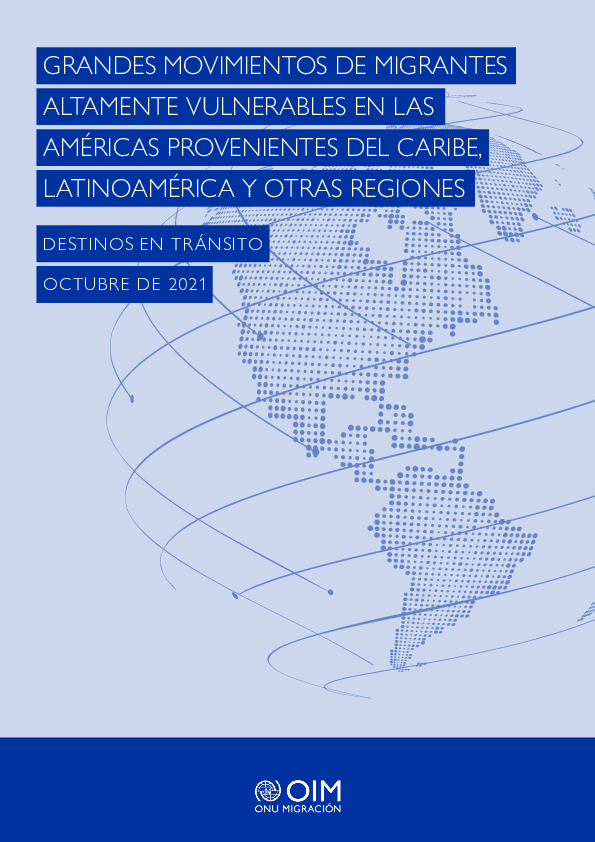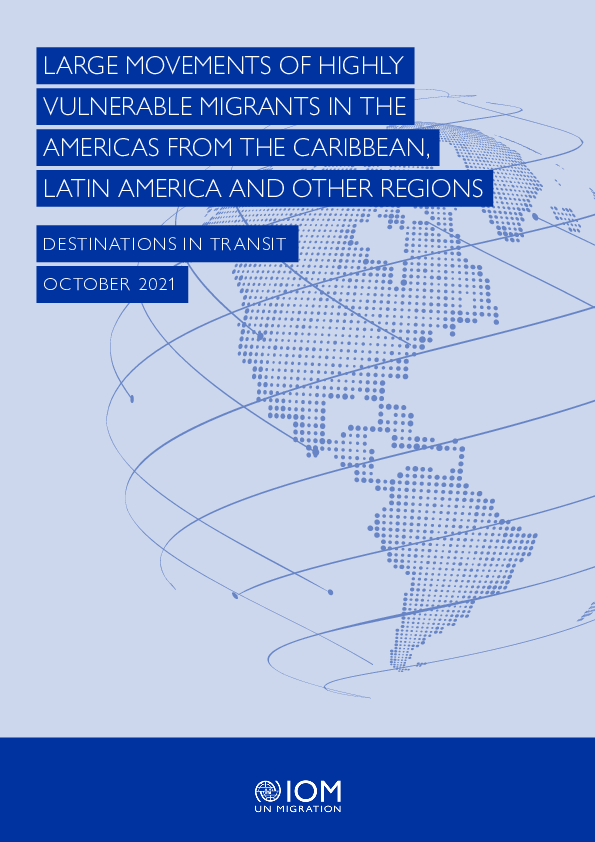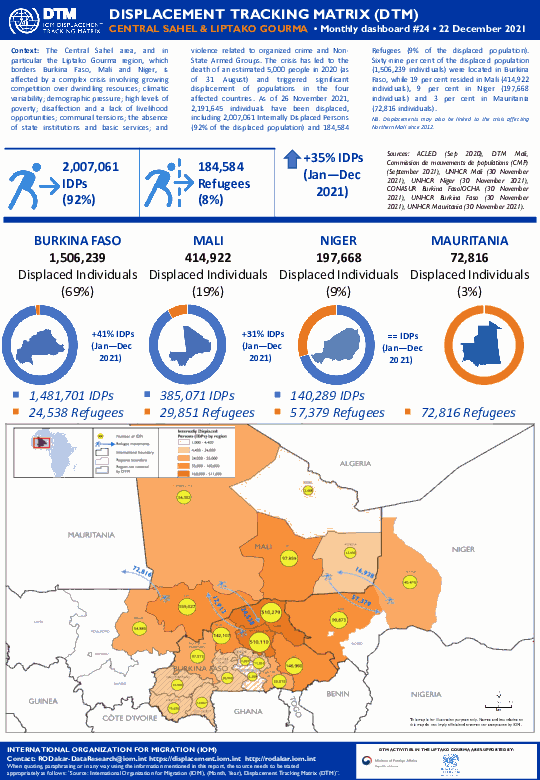-
Countries
-
Data and Analysis
-
Special Focus
-
Crisis Responses

Contact
DTMAfghanistan@iom.int
Language
English
Location
Afghanistan
Period Covered
Apr 01 2021
Jun 30 2021
Activity
- Site Assessment
- Mobility Tracking
In April through June 2021, DTM implemented the Community-Based Needs Assessment (CBNA) at the settlement level, as an integral component of DTM's Baseline Mobility Assessment (BMA), providing a comprehensive overview of the evolving, multi-sectoral needs in settlements hosting IDPs and returnees.

Contact
dtmcovid19@iom.int
Language
English
Location
Global
Period Covered
Mar 13 2020
Dec 16 2021
Activity
- Mobility Tracking
- Points of Entry (PoE)
IOM COVID-19 Impact on Points of Entry Bi-Weekly Analysis is meant to serve IOM Member States, IOM, UN and voluntary partner agencies, the civil society (including media) as well as the general population in analysing the impact of COVID-19 pandemic on Points of Entry. It is particularly relevant when identifying and addressing specific needs faced by migrants and mobile populations, disproportionately affected by global mobility restrictions. The report is based on information provided by IOM field staff, using resources available at the IOM country office level and is accurate to the best of IOM’s knowledge at the time of compilation. All information is being constantly validated, including the geolocation and attributes, and through regular assessments and triangulation of information. The updates depend on the time frame within which the information becomes available and is processed by IOM. For this reason, the analysis is always dated and timestamped in order to reflect reality at a given time. However, as the situation continuously evolves and changes, despite IOM’s best efforts, the analysis may not always accurately reflect the multiple and simultaneous restrictive measures being imposed at a specific location.
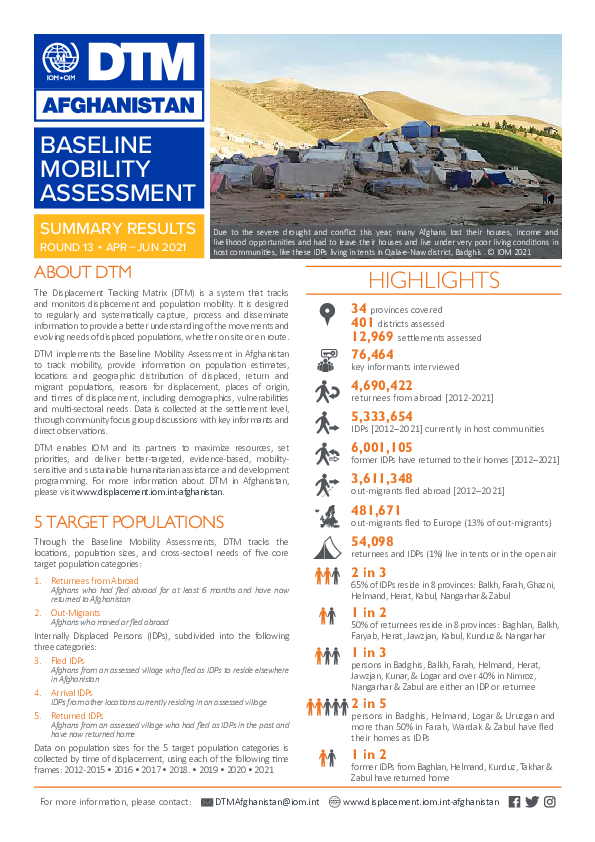
Contact
DTMAfghanistan@iom.int
Language
English
Location
Afghanistan
Period Covered
Apr 01 2021
Jun 30 2021
Activity
- Mobility Tracking
- Baseline Assessment
In Afghanistan, DTM employs the Baseline Mobility Assessment tool, designed to track mobility, determine the population sizes, locations and geographic distribution of forcibly displaced, return and migrant populations, reasons for displacement, places of origin, and times of displacement, as well as basic demographics, vulnerabilities and priority needs. Data is collected at the settlement level, through community focus group discussions with key informants and direct observations.
As of 30 June 2021, 34 provinces, 401 districts and 12,969 settlements have been assessed, including interviews with 76,464 key informants. Between 2012 and June 2021, 4,690,422 returnees and 5,333,654 IDPs currently living in host communities were identified.
La migración en América del Sur y Central ha visto importantes cambios en las últimas dos décadas. La migración intrarregional sigue siendo la más importante en América del Sur, sobre todo debido a los movimientos a gran escala de personas migrantes y refugiadas venezolanas en los últimos cinco años. Mientras tanto, la migración desde América Central ha aumentado significativamente en los últimos años. Además, las nacionalidades de las personas migrantes se han diversificado en gran medida, incluyendo a nacionales de países del Caribe y de otros continentes como Asia y África.Este informe busca dar cuenta de la magnitud, evolución y trayectoria de dichos movimientos en los últimos años. Esta situación no es un cambio repentino si no que se funda en un conjunto de factores y una diversidad de migrantes, medidas y cambios socioeconómicos, sanitarios y políticos recientes en países de destino anteriores en América del Sur como en los países de origen y tránsito de esta población migrante. La comprensión de esos factores habilita a un análisis pertinente para el desarrollo de políticas y medidas públicas que puedan asegurar una migración ordenada, segura y regular protegiendo los derechos humanos de las personas migrantes.
Migration in South and Central America has undergone significant changes in the last two decades. Intraregional migration continues to be the most important in South America, mainly due to the large-scale movements of Venezuelan migrants and refugees in the last five years. Meanwhile, migration from Central America has increased significantly in recent years. In addition, the range of nationalities of migrants has become more diverse, and includes nationals from Caribbean countries and from other continents such as Asia and Africa. This report seeks to account for the size, evolution and routes of these movements from other regions in recent years. It is not a sudden movement but is based on a set of factors and a diversity of migrants, and also on recent socio-economic, health and political changes and measures in their previous countries of destination in South America, as well as in the countries of origin and transit of this migrant population. Understanding these factors allows a proper analysis to be carried out for developing public policies and measures that can ensure orderly, safe and regular migration while protecting the human rights of migrants.
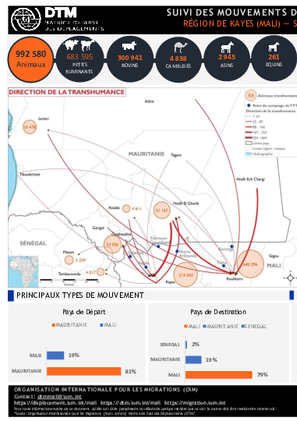
Contact
DTM Mali, DTMMali@iom.int
Language
French
Location
Mali
Period Covered
Sep 01 2021
Oct 31 2021
Activity
- Event Tracking
- Survey
- Flow Monitoring Survey
- Flow Monitoring
Afin de mieux comprendre les tendances des mouvements transhumants et l’impact des fragilités sur les communautés transhumantes, l’OIM, à travers la Matrice de suivi des déplacements (DTM), a déployé depuis juillet 2021 l’outil de suivi de la transhumance (Transhumance Tracking Tool - TTT). Dans le cadre de cet exercice, six points de comptage ont été retenus au Mali : Séguéla, Djélébou dans le cercle de Kayes; Kremis dans le cercle de Yélémané; Gavinane dans le cercle de Nioro; Korongo et Falou dans le cercle de Nara. Le TTT permet de comprendre les dynamiques liées à la transhumance transfrontalière entre le Mali et la Mauritanie. Il combine trois composantes : le suivi des flux, l’enquête détaillée et l’alerte. Ce rapport présente les données de l’enquête détaillé, du comptage et de l’alerte dans le cadre du TTT pour les mois de septembre et octobre 2021.
La région du Sahel central, et plus particulièrement la zone du Liptako Gourma, qui enjambe le Burkina Faso, le Mali et le Niger, est témoin d’une crise complexe qui comprend comme enjeux une compétition grandissante pour le contrôle de ressources; des bouleversements climatiques; une croissance démographique galopante; des niveaux élevés de pauvreté; l’absence d’opportunités économiques et un sentiment de désillusions quant au futur; des tensions communautaires; l’absence de présence étatique et le manque de services sociaux de base; et des violences provoquées par des réseaux de crime organisé et des groups armés non étatiques. La crise a engendré, en 2020, la mort de 5 000 personnes 2020 (au 31 août) et conduit à des déplacements de populations significatifs dans les quatre pays touches par la crise. Au 22 déc. 2021, 2 191 645 individus étaient déplacés par la crise, y compris 1 933 045 Personnes déplacées internes (92% de la population affectée) et 184 584 réfugiés (8%). Soixante-neuf pour cent de la population déplacée (1 506 239 personnes) se trouvaient au Burkina Faso, 19 pour cent au Mali (414 922), 10 pour cent au Niger (197 668) et 3 pour cent en Mauritanie
(72 816).
The Central Sahel area, and in particular the Liptako Gourma region, which borders Burkina Faso, Mali and Niger, is affected by a complex crisis involving growing competition over dwindling resources; climatic variability; demographic pressure; high levels of poverty; disaffection and a lack of livelihood opportunities; communal tensions; the absence of state institutions and basic services; and violence related to organized crime and Non-State Armed Groups. The crisis has led to the death of an estimated 5,000 people in 2020 (as of 31 August) and triggered significant displacement of populations in the four affected countries. As of 26 November 2021, 2,191,645 individuals have been displaced, including 1,506,239 Internally Displaced Persons (92% of the displaced population) and 184,584 Refugees (9% of the displaced population). Sixty-nine per cent of the displaced population (1,506,239 individuals) were located in Burkina Faso, while 19 per cent resided in Mali (414,922 individuals), 9 per cent in Niger (197,668 individuals) and 3 per cent in Mauritania (72,816 individuals).
La crise dans le Bassin du lac Tchad est le résultat d’une combinaison complexe d’une multitude de facteurs, y compris un conflit armé impliquant des groups armés non étatiques, des niveaux extrêmes de pauvreté, un sous-développement persistent, et des bouleversements climatiques, qui ont conduit à des déplacements de populations importants. Au 22 décembre 2021, le Cameroun, le Tchad, le Nigeria et le Niger accueillaient 5 462 244 individus affectés par la crise, dont des Personnes déplacées internes (PDI), des réfugiés et des retournés (anciennes PDI et retournés de l’étranger). 76 pour cent d’entre eux (soit 4 143 802 personnes) se trouvaient au Nigéria, 11 pour cent au Cameroun (608 076 personnes), 9 pour cent au Tchad (477 269 personnes) et 4 pour cent au Niger (233 097 personnes).
The crisis currently affecting the Lake Chad Basin states results from a complex combination of factors, including conflict with Non-State Armed Groups, extreme poverty, underdevelopment and a changing climate, which together have triggered significant displacement of populations. As of 22 December 2021, Cameroon, Chad, Niger and Nigeria were hosting an estimated 5,462,244 affected individuals made up of Internally Displaced Persons (IDPs), Refugees (both in- and out-of-camp), Returnees (Former IDPs and Returnees from abroad) and Third Country Nationals (TCNs). 76 per cent of the affected population (representing 4,143,802 individuals) were located in Nigeria, while 11 per cent resided in Cameroon (608,076 individuals), 9 per cent in Chad (477,269 individuals) and 4 per cent in Niger (233,097 individuals).
